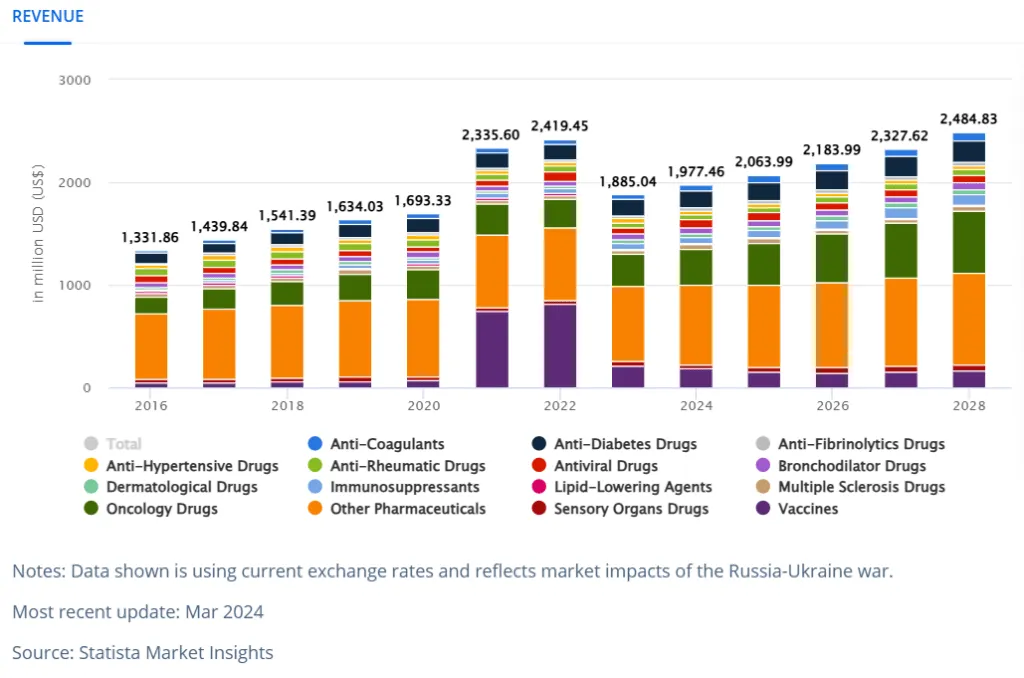Market Insight: Pharmaceuticals in Thailand
Thailand’s pharmaceuticals market is projected to reach US$1.98 billion in 2024. The largest market segment is Oncology Drugs, expected to achieve a volume of US$360 million in 2024. With an annual growth rate of 5.88% (CAGR 2024-2028), the market is anticipated to reach US$2.49 billion by 2028. Additionally, there is a growing demand for herbal medicines and traditional remedies. Leveraging insights provided by our team of Thailand healthcare consulting experts can help stakeholders navigate this dynamic market effectively.

Customer Preferences in the Medicine Market
Thai consumers have shown an increasing demand for high-quality healthcare services, including pharmaceutical products. There is a strong preference for products that are affordable, effective, and have minimal side effects. The aging population in Thailand has contributed to an increase in chronic diseases, further driving the demand for pharmaceutical products. This demographic shift necessitates the availability of a broad range of medications, particularly those targeting age-related conditions.
Moreover, Thai consumers are becoming more health-conscious, seeking preventive care and wellness products. This trend has led to an increased interest in vitamins, supplements, and over-the-counter medications. The awareness and adoption of herbal medicines and traditional remedies have also risen, reflecting a cultural preference for natural and holistic healthcare solutions.
Trends in the Thai Prescription Drug Market
One significant trend in the Thai pharmaceuticals market is the growing shift towards generic drugs. This shift is largely driven by government policies promoting the use of affordable generic drugs to reduce healthcare costs. Generic drugs offer a cost-effective alternative to brand-name medications, making them more accessible to a wider population. This policy is part of Thailand’s broader strategy to improve healthcare affordability and accessibility.
Additionally, pharmaceutical companies are increasingly investing in research and development to create innovative drugs and treatments. This investment is critical for addressing the evolving healthcare needs of the population and staying competitive in the global market. The rise of digital technologies in healthcare, such as telemedicine and e-pharmacies, has also made healthcare services more accessible and convenient for consumers. These digital solutions are transforming the way healthcare is delivered, making it easier for patients to obtain medications and consult with healthcare providers remotely.
Local Special Circumstances
The Thai government has been proactive in fostering the growth of the pharmaceuticals market through various policies and initiatives. The establishment of the Thailand Center of Excellence for Life Sciences (TCELS) is a notable effort to support research and development in the industry. TCELS aims to enhance the country’s capabilities in life sciences and biotechnology, providing a platform for innovation and collaboration among researchers, businesses, and healthcare providers.
Moreover, the government has implemented tax incentives to lure foreign pharmaceutical companies to invest in the country. These measures are designed to enhance Thailand’s competitiveness in the global pharmaceuticals market and encourage innovation within the industry. By creating a favorable business environment, the government aims to position Thailand as a regional hub for pharmaceutical manufacturing and research.
Underlying Macroeconomic Factors
Thailand’s robust economic growth and increasing healthcare expenditure have significantly contributed to the growth of the pharmaceuticals market. The country’s strategic location and well-developed infrastructure make it an attractive destination for pharmaceutical companies looking to invest and expand their operations. Additionally, Thailand’s growing middle class is driving demand for better healthcare services and pharmaceutical products.
Thailand’s economic stability and favorable investment climate have also played a crucial role in attracting foreign direct investment in the pharmaceuticals sector. The country’s participation in various international trade agreements further enhances its appeal as a business destination. Moreover, the government’s commitment to healthcare reforms and public health initiatives ensures sustained demand for pharmaceutical products.
Conclusion
In conclusion, Thailand’s pharmaceuticals market is poised for continued growth, driven by increasing demand for high-quality healthcare services, the shift towards generic drugs, and supportive government policies. The integration of digital technologies and favorable macroeconomic conditions further bolster this growth. For stakeholders in the Thailand healthcare sector, these insights highlight significant opportunities for investment and development within the pharmaceuticals market. As the market evolves, Thailand healthcare consulting firms will play a pivotal role in guiding businesses to navigate the complexities and seize emerging opportunities.







